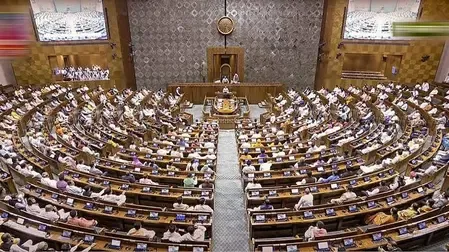Bihar Police Issues High Alert Amid Waqf Bill Discussions

Synopsis
Key Takeaways
- Bihar Police has issued a high alert across the state.
- Ongoing debates on the Waqf (Amendment) Bill have raised concerns.
- ADG Law and Order emphasized maintaining peace.
- Protests against the Bill reflect community concerns.
- Political tensions are rising in response to the Bill.
Patna, April 3 (NationPress) The Bihar Police Headquarters has issued a high alert across the state on Thursday due to the ongoing discussions regarding the Waqf (Amendment) Bill in Parliament.
ADG Law and Order, Pankaj Darad, has instructed all Inspector Generals of Police (IGs), Deputy Inspector Generals of Police (DIGs), Senior Superintendents of Police (SSPs) and Superintendents of Police (SPs) to stay alert and ensure that peace and order are preserved throughout the state.
He stressed that anyone attempting to disrupt law and order will encounter immediate legal consequences.
The police's heightened alert is aimed at averting any escalation of tensions and to guarantee the safety and security of all citizens following the discussions and debates in Parliament regarding the Waqf Bill.
The Waqf (Amendment) Bill, presented by Minority Affairs Minister Kiren Rijiju in the Lower House of Parliament on Wednesday, proposes significant alterations to the management of Muslim-endowed properties, known as Waqfs.
Key features include the inclusion of non-Muslim members in Waqf boards and increased government oversight to address alleged corruption and enhance diversity.
Proponents of the Bill argue that these changes are aimed at improving transparency and efficiency in Waqf property management. However, the Bill has encountered strong opposition from various Muslim organizations and political parties.
Critics argue that the proposed modifications could undermine Muslim property rights and lead to the confiscation of historic mosques and other religious sites.
They perceive the Bill as discriminatory and an attempt to erode minority rights. In Bihar, members of the Muslim community have been actively protesting against the bill, voicing concerns over its potential effects on their religious and cultural heritage.
The All India Muslim Personal Law Board (AIMPLB) has declared intentions to challenge the Bill in court and has called for nationwide peaceful protests should the legislation be enacted. Meanwhile, political responses in Bihar have varied.
RJD Spokesperson Mritunjay Tiwari criticized the Bill, accusing the government of acting dictatorially and sowing seeds of hatred.
“The government has passed the Waqf (Amendment) Bill. We all opposed it, but the government had the numbers. All NDA allies are no longer parties, but they are merely factions of the BJP. They could merge with the BJP at any time. There will be a massive upheaval in JD-U leading up to the Bihar Assembly election. This government will not persist indefinitely. The government is behaving in a dictatorial manner. They are solely sowing the seeds of hatred,” Tiwari stated to IANS.
The Waqf (Amendment) Bill is set to face a critical Rajya Sabha test on Thursday, a day after passing through the Lok Sabha following an extensive 12-hour debate.
The Upper House experienced repeated rounds of verbal conflicts as the treasury and opposition benches clashed over various issues, including Leader of Opposition in the House Mallikarjun Kharge’s Waqf landholding claims and ‘Pakistan Zindabad’ slogans raised after the Congress MP's election victory in Karnataka.
The uproar also saw interventions from Home Minister Amit Shah, who accused the opposition of spreading misinformation about the Waqf Bill and rebutted claims that the BJP was attempting to polarize the electorate with amendments in the legislation.









